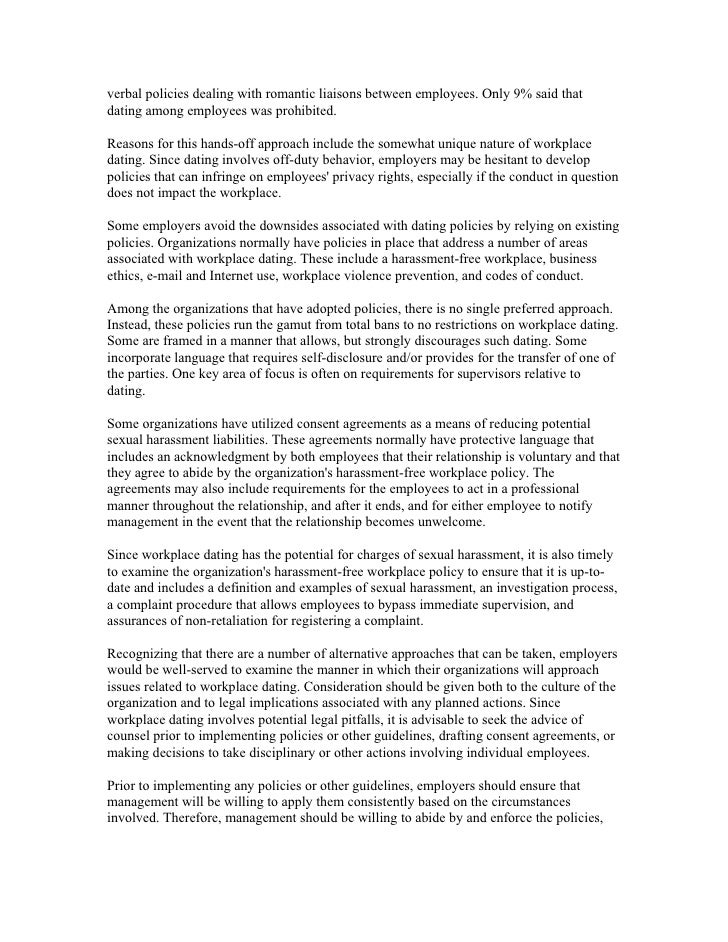- Addressing Romantic Relationships in the Workplace Through a Conflict of Interest Policy
- Policies About Workplace Dating
- Policies About Workplace Dating | media-aid.com
- The Law and Workplace Dating
A better approach is to avoid policies that punish consensual romantic relationships, and instead, to implement policies that address the actual and perceived conflicts of interest that can arise out of romantic relationships in the workplace — while strictly enforcing policies against unlawful harassment.
Conflicts of interest in the workplace, or their appearance, can arise from many types of relationships. These are conflicts that the employer should expect the employee to report, and in the latter case, the vendor as well. But what about relationships where the apparent conflict of interest is more subtle, such as where:. Although the above relationships appear to create the potential for conflicts of interest, they would likely go unreported to an employer that did not impose a duty on its employees to report such relationships.
Workplace romantic relationships create a similar potential for conflict as in the examples above. The answer depends on the size of the company and the role, as well as the influence and input an employee has relative to her romantic partner.
Addressing Romantic Relationships in the Workplace Through a Conflict of Interest Policy
For example, a conflict of interest clearly arises where a supervisor has direct input into the terms and conditions of employment of her romantic partner. But the potential for conflict of interest is not limited to a direct reporting relationship. For example, an actual or perceived conflict of interest could arise where a CFO provides input into the budget of a department where her romantic partner works, or where a VP of Operations has input into a reduction of force that could affect the department where his romantic partner works.
- Labor & Employment Contacts;
- HR Policies & Procedures!
- geology relative age dating.
- nathan for you dating website.
- Can an Employer Prohibit Employees from Dating One Another??
Maria Stewart, a partner at Austin law firm Brown McCarroll LLP, suggests in the Austin Business Journal that policies on dating should include a way to report relationships that have turned hostile, and that employers must be on guard against any circumstances that could amount to harassment. She argues that any policy must be applied consistently and should set out clearly how decisions will be made.
Policies About Workplace Dating
Since graduating with a degree in biology, Lisa Magloff has worked in many countries. Accordingly, she specializes in writing about science and travel and has written for publications as diverse as the "Snowmass Sun" and "Caterer Middle East. Skip to main content.
No-Dating Policies No-dating policies generally ban dating between a supervisor and their subordinate. Notification Policy Another option is to require employees to report whenever they enter into a consensual relationship. Love Contracts This is a written confirmation to management that any relationship taking place between employees is consensual. Employee's Legal Rights The U. Policy Guidelines When writing a workplace dating policy, it is important to reduce your potential legal liability.
Policies About Workplace Dating | media-aid.com
References 4 Austin Business Journal: Set tone from the top on workplace dating HRhero. How far should yours go? About the Author Since graduating with a degree in biology, Lisa Magloff has worked in many countries. Again, there are no laws which prohibit employee dating per se.
The Law and Workplace Dating
Of course, as with any personnel policy or practice, decisions around employee dating will be subject to general anti-discrimination scrutiny. This means employers can face discrimination liability if, for example, it is shown they permitted dating among employees who are under 40 but not among employees over 40, among straight employees but not gay employees and the like.
Beyond these risks, the primary concern around workplace dating is that, one day, a participant in the relationship scorned or otherwise later claims the relationship was in fact a form of sex harassment. Notably for purposes of employee dating, there has also been some litigation surrounding "sexual favoritism," or the theory that it is unlawful discrimination for an employee to show preferential treatment to that person's romantic partner at the expense of other employees not involved in the relationship although -- full disclaimer -- courts are not uniformly aligned on this issue, and employers in many instances may have sound legal and factual defenses.
No matter how you look at it, both legal and practical risks abound when someone has to supervise or even indirectly analyze or critique the work performance of their special someone. With this legal backdrop in mind, here are a few tips for crafting non-fraternization policies: All the risks associated with interoffice dating are exacerbated when there is an inherent power imbalance between a supervisor and that person's subordinate.

However, if you find yourself in a situation in which you believe you have no choice operationally but to allow such a relationship, actively manage the risk.
